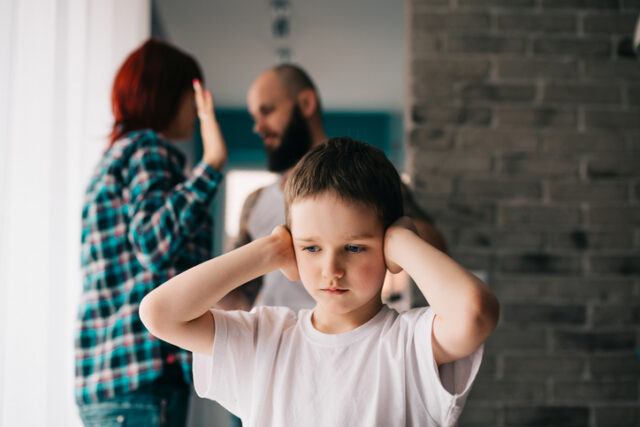Going through trauma, whether when growing up or even in your adult life, can leave you feeling completely broken.

That doesn’t mean you’re not strong or capable, just that you’ve been through some tough times and you’re only human. While feeling overwhelmed, powerless, and despondent is totally natural after experiencing tough times, it doesn’t have to be permanent — nor should it be. Here are just some of the experiences that lead to that “broken” feeling, as well as some ways to work through it. Of course, if you’re really struggling, consider working with a professional therapist or counsellor, or call Samaritans at 116 123 for more immediate help.
1. Growing up in a chaotic home

Living with constant yelling, arguments, or unpredictability as a child can make the world feel unsafe. This often leads to struggles with trust and stability as an adult. Start small by creating your own version of security—whether it’s decorating your space to feel cosy, setting personal routines, or limiting interactions with draining people. Healing begins with reclaiming calmness.
2. Being dismissed or ignored by loved ones

When people close to you shrug off your feelings, it can leave deep scars, making you doubt your worth or feel invisible. Practice speaking up in small, non-confrontational ways. Even if it’s just being honest with a friend about how you feel, this can help you reconnect with the belief that your voice matters. Gradually, you’ll attract those who truly listen.
3. Experiencing financial instability as a child

Growing up in a home where money was tight can create anxiety around finances or feelings of scarcity, no matter how much you earn now. Break this cycle by celebrating small wins, like budgeting successfully for something you love. It’s a reminder that your hard work pays off, even in tiny increments.
4. Feeling ostracised during school years

Being the odd one out in school can lead to an adult fear of rejection or not fitting in. Try finding communities that align with your passions—whether it’s book clubs, sports groups, or online forums. Sharing interests can often create organic friendships where you feel valued.
5. Going through betrayal by close friends

When trust is broken by those you hold dear, it can feel impossible to let people in again. Take it slow by setting boundaries that protect your peace. Trust doesn’t have to be given all at once; it can build over time through consistent actions.
6. Being over-criticised in your youth

Constantly hearing “you’re not good enough” or “why can’t you do better?” can leave you chasing perfection as an adult. Challenge this voice by actively celebrating small successes, even if it’s just getting through the day. It’s a reminder that you’re doing your best, and that’s enough.
7. Facing neglect during formative years

When your basic emotional needs are ignored growing up, you might struggle to understand what you deserve in relationships. Start practising self-care rituals, even if it feels strange at first. Learning to treat yourself kindly sets the tone for how other people should treat you, too.
8. Dealing with sudden loss or grief

Losing someone close too soon can leave a void that feels impossible to fill. Honour their memory by embracing moments they’d have loved—like taking a walk they enjoyed or cooking their favourite meal. These acts can offer comfort while keeping them close in spirit.
9. Being pushed into the caregiver role too young
 Source: Unsplash
Source: Unsplash Taking on adult responsibilities before you’re ready can lead to burnout or feeling like you always have to “fix” things. Give yourself permission to say no or delegate tasks. It’s not selfish to prioritise your own well-being—it’s essential.
10. Living through a toxic romantic relationship

Being with someone who undermined your confidence can leave you doubting your worth long after they’re gone. Rebuild by journaling affirmations or engaging in hobbies that remind you of your individuality. Slowly, you’ll realise that your value isn’t tied to anyone else’s opinion.
11. Witnessing addiction in loved ones
 Source: Unsplash
Source: Unsplash Watching someone you care about struggle with addiction can make you feel powerless or burdened by guilt. Acknowledge that their choices aren’t your responsibility. Focus instead on what brings you peace, whether that’s therapy, hobbies, or setting healthy boundaries with them.
12. Growing up with unspoken family secrets

Families that sweep things under the rug often leave kids feeling confused or mistrustful. As an adult, get clarity where you can—either through therapy or open conversations with those willing to talk. Understanding the past can help you let go of its weight.
13. Being humiliated in public situations

Moments of public embarrassment, especially during the formative years, can make you fear vulnerability. Start reclaiming your confidence by sharing playful stories of those moments with people you trust. Turning painful memories into relatable anecdotes can help you see them in a softer light.
14. Feeling overshadowed by siblings or peers

Constantly being compared to other people can make you feel like you’re never enough. Focus on what sets you apart—your unique strengths, quirks, and achievements. Even small steps, like listing what you’re proud of, can remind you of your individuality.
15. Being judged for your appearance

Criticism about your looks can stick with you long after the words were spoken, leading to self-consciousness. Take back control by experimenting with styles that make you feel good. Confidence isn’t about meeting other people’s expectations; it’s about finding what works for you.




